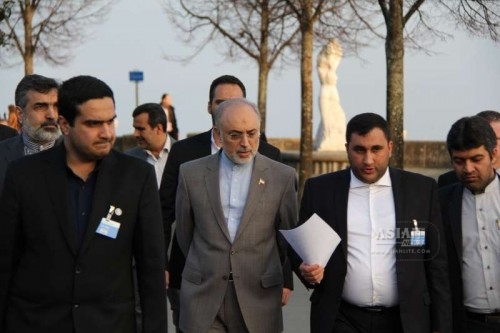
By Aadil Mir
As the June 30 deadline to resolve the contentious Iran nuclear issue between Tehran and six world powers nears, there still remain several roadblocks which could hamper the progress made so far.
The insistence by the five veto-wielding members of the UN Security Council and Germany for inspecting Iran’s military sites and questioning its atomic experts is the main obstacle in resolving the issue.
Tehran, on its part, has rejected the demand as being completely off-the-table and instead asked for the 13-year-old economic sanctions to be lifted without further delay.
Iranian Supreme Leader Ayatollah Ali Khamenei has said Tehran would not accept “unreasonable demands” by the world powers during negotiations over its nuclear programme, and ruled out letting inspectors interview its atomic scientists.
But the US remains firm on its stand that it will not extend the talks beyond the June 30 deadline, even as P5+1 countries make last ditch efforts to reach a final deal.
France, which has demanded more strictness in implementing the economic sanctions against Iran, has indicated that discussions were likely to slip into July.
Iran’s senior nuclear negotiator Abbas Araghchi also warned that the deadline might need to be extended.
The current sanctions against Iran since 2002 – barring it from exporting oil and other goods – cost Iran $4 billion to $8 billion a month. Iran’s oil exports have fallen to 700,000 barrels per day (bpd) by May 2013, compared to an average of 2.2 million bpd in 2011. The sanctions are supported by the world’s major powers but are ignored by countries like Russia and China.
However, in the present scenario, if the other countries come to the conclusion that the US has turned down a reasonable offer that Iran made, they are unlikely to continue their support for the sanctions that have imposed a high economic burden on Iran.
Many countries are eager to buy oil from Iran – the world’s seventh largest petroleum producer – which sells at a discount.
A 2012 study by independent global policy think-tank Rand Research And Development noted: “Over the past several years, China has become Iran’s biggest oil customer and biggest economic partner.”
China could view the West’s isolation of Iran as an opportunity to build a special relationship with it and develop that country’s vast energy economy besides securing a sea port in the warm waters of the Arab Gulf.
If, however, the sanctions can be maintained, Iran will be in deep trouble. Oil prices have halved and Iran is bleeding resources in Syria and Iraq (besides Yemen, though considerably less there).
Interestingly, Iran has expanded its nuclear programme even while under strict sanctions for the last dozen years.
In 2003, Iran had fewer than 200 centrifuges but today has 19,000. Iran’s nuclear establishment is also much larger.
Keeping in mind that Iran began showing active interest in a nuclear programme as early as the 1950s, it now has thousands of nuclear scientists and technicians who work in the field.
That raises the spectre of a military attack option, say, by Israel similar to the one against an Iraqi reactor in 1981 and a Syrian facility in 2007 – but those were single facilities.
Iran, by contrast, has a vast nuclear industry, comprising many installations spread across the country, some close to population centres, while others lie in mountainous terrain.
For it to effectively degrade Iran’s nuclear capabilities, the US would have to go to war with Iran, destroying its air defences, then attacking its facilities in hundreds of raids, which could also produce considerable collateral damage.
But under such an attack the Tehran regime would likely gain domestic support. It could also respond in various ways, through its proxies in Afghanistan, Iraq, Lebanon and elsewhere. The retaliatory attacks might be directed at the US or its allies.
A US attack would also mean the splintering of the international coalition against Iran. Russia, China and many other countries would possibly condemn it. Iran would be seen as the victim of an unprovoked invasion. The sanctions would crumble.
Iran’s nuclear programme would be devastated, but it could rebuild it. Even under the current sanctions regime, Iran makes tens of billions of dollars in oil revenues, more than enough to afford to rebuild its facilities.
Morever, once it had been attacked, Tehran may invoke the need for a deterrent against future attacks and would likely work speedily to build a nuclear arsenal – something which the world powers want to deter it from doing.